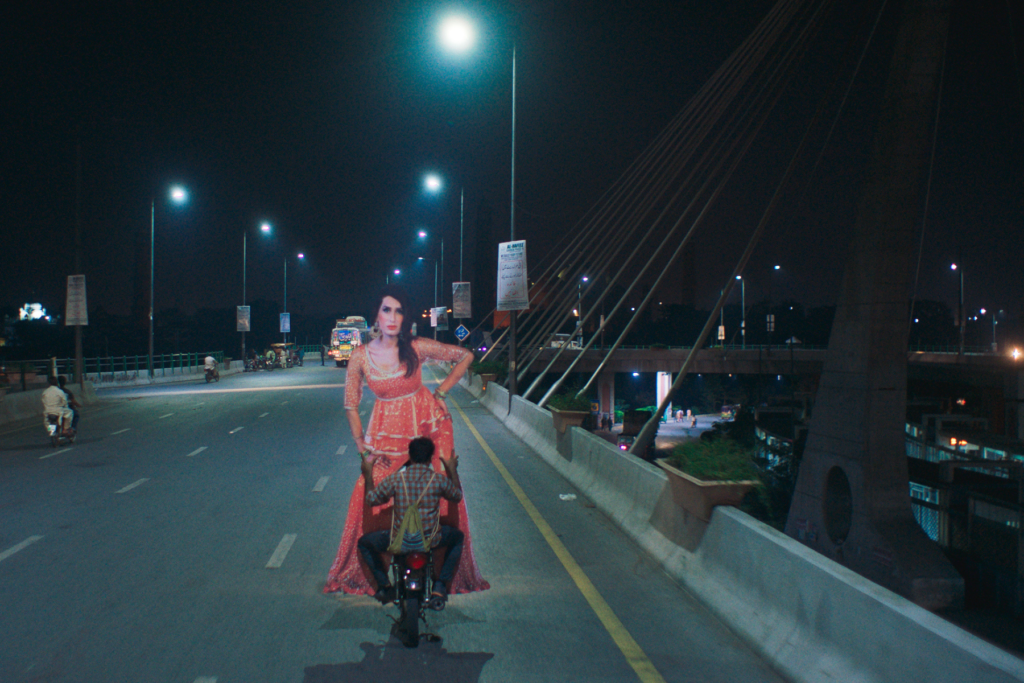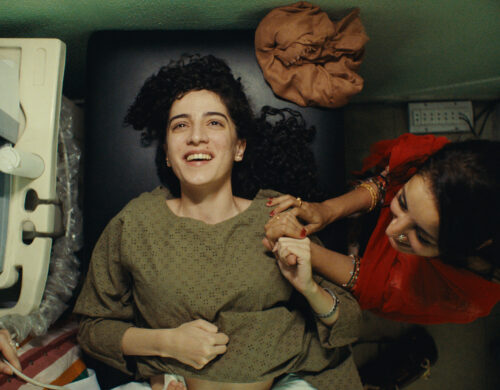
Haider wades his way through Karachi’s expansive beach, climbing and tumbling over rocks, in Mumtaz’s memory. The vast landscape is perfectly encapsulated in the 4:3 aspect ratio — an unconventional yet welcoming choice. He vanishes into the sea, leaving his storyline open-ended. The screen fades to black. The film comes to a close. The gentle humming and lapping of the waves disappear. However, I stay put. Stumped, and unable to comprehend the masterpiece that Saim Sadiq, director of “Joyland”, has blessed Pakistanis with.
[Read Related: Pakistan Had its First-Ever Trans Pride Parade in Lahore]
The winner of the jury prize at the Cannes film festival, as well as Pakistan’s entry for the Academy Awards 2023, “Joyland” has been marred with controversies (and subsequent bans) from the onset of its win. Ironic, since the film’s core message promotes tolerance and acceptance. Tolerance for unconventional norms, sexual/gender identities, and human emotions and desires.
“It’s so important to narrate these stories in today’s world, where we’re often divided and seldom united,” says producer Apoorva Charan during an exclusive chat with Brown Girl Magazine.
It’s her feature film debut as a producer, and she’s justifiably beaming with pride.
Joyland is such a win for South Asia, but particularly, Pakistani storytelling. Every person I met, I felt like there was some characteristic or quirk about them that mirrored our characters in the film.
Set in the depths of androon Lahore, “Joyland” primarily revolves around Haider (Ali Junejo) — a meek, unemployed house husband in a borderline, passionless marriage. He’s happily helping Saleem bhai (Sohail Sameer) and Nucci bhabi (Sarwat Gilani) raise three kids, while the fourth one breaks Nucci’s water in the opening scene. Another girl is born, despite the ultrasound’s previous declaration of a baby boy.
“If I were to receive an award based on my character in “Joyland”, it’d definitely be for “best at single-handedly increasing the population of Pakistan,” says Gillani, as we howl with laughter during our spoiler-riddled chat with the cast of the film. “I think that, combined with the ‘coolest bhabi’ — those two will have my name on them.”
I think my philanthropic work plays a part in how I started saying no to bechari roles. How can I be a role model to these women I’m trying to help, while playing the same characters? The change came about with “Churails” and I vehemently stuck to it. My characters need to have a voice; a backbone.
On the other hand, Haider’s wife, Mumtaz (Rasti Farooq), works as a beautician at the local salon, busy dolling up brides in Lahore’s unpredictable load-shedding.
Both Haider and Mumtaz seem to have a relatively stable marriage based equally on societal expectations and gender-flipped roles. While Haider stays home, helps in the kitchen, and attempts at searching for a traditional job, Mumtaz carves autonomy and independence for herself. This is in spite of an oppressive family life characterised and dictated by Haider’s overly conservative, traditionalist father and patriarch, Rana (Salmaan Peerzada), who wishes for the couple to procreate a cricket team of just boys.
But Rana, known as Abba Jee, is also layered with his own 50 shades of grey, struggling with loneliness and a lack of intimacy, mirrored in his relationship with next-door neighbour Fayyaz (Sania Saeed). His emotional desires are symbolised by his physical impediments — the former handicapped with “what will people say”, and the latter with a wheelchair. The rules that he has for his children are the same that his children have for him, bound by tradition, norms, and society. They are not allowed to stray from what is considered “normal”.
The film’s women are strong which is pretty much a reflection of the women in Sadiq’s life. While Abba Jee shuns the love and companionship that Fayyaz offers, she stands her ground until firmly asked to leave. The complexity of each person’s emotions versus expectations is what makes “Joyland” relatable on a human level.

Alternatively, Mumtaz’s relationship with Haider is based on convenience and habit, where two people share the same bed but sleep facing away (partially because one of Saleem and Nucci’s young daughters crashes with them every night, illustrating the confined space both Haider and Mumtaz are allowed to be themselves in). The dynamics of their marriage drastically evolve once Haider’s eye catches Biba (Alina Khan), covered in blood as she walks numbingly into the hospital where Nucci gave birth. The introductory scene mirrored the brutal reality of violence inflicted upon Pakistan’s trans community; one of “Joyland’s” most haunting moments.
Mumtaz is asked to quit her job once Haider lands a gig as a “theatre manager” — a cover-up for his job as a background dancer at the nightclub Biba coincidentally performs at. The film portrays the traditional Pakistani marital social dynamic; men must work, and women must housekeep. Even when some level of independence is allowed to a married woman, she must forego her right to a career later in life. Understandably, it leaves Mumtaz devastated.
“It’s so strange how that’s just an acceptable act in our society,” Farooq chimes in, voicing Mumtaz’s thoughts. “Even if a woman is good at a 100 things, ultimately, she’s expected to quit her job to be a homemaker because that’s ‘her job’.”
With time, Haider falls into a routine and rhythm of working at the theatre and spending more time with Biba, allowing him an insight into the widespread transphobia she’s regularly faced with. Biba confides her innermost desire to be what she termed as “a complete woman” in order to land the same dancing opportunities as her counterparts.
View this post on Instagram
Haider’s daring closeness to Biba leaves Mumtaz — who at this point is reliant on him as a best friend more than the physical intimacy he fitfully provides her — alone, isolated, and depressed. For Haider, it is liberating to leave problems at home and escape into a secret world centred around his deepest desires. He doesn’t want to be a bad person. He doesn’t wish to hurt or leave his wife. But his happiness now seemingly lies in dancing and exchanging stolen kisses with Biba. Farooq agrees:
I think Mumtaz and Haider were best friends at this point. They had an unspoken love for each other, which stemmed from the sanctity of their relationship. They might not be in love but they did love each other. In the eyes of our society and otherwise, they were married, but they’d drifted so far apart. There was love but it wasn’t possible to return from how distant they were.
This point of no return brings Haider to a crossroads — one where he is torn between his loyalty to Mumtaz and his love for Biba. Ultimately and ironically, in a particularly passionate moment, it is his curiosity pertaining to Biba’s sexuality that drives her to throw him out of her life. Defeated and guilt-ridden, he comes face-to-face with a pregnant and non-confrontational Mumtaz, who, by now, is aware of what Haider has been up to but doesn’t have the mental capacity to verbally digest his infidelity alongside a child she doesn’t want.
Her apprehensions about bearing and raising children are indicated throughout the early days of her pregnancy. The clutching of her stomach, the tightening of the rollercoaster belt during a visit to Joyland park, and her unease during the ultrasound are just a few examples of Mumtaz’s angst.
Abba Jee’s 70th birthday was the straw that broke the camel’s back. Mumtaz, surrounded by family and friends and feeling emptier than ever, takes her own life. A tragic full circle where one life ends as the other begins. Her suicide is harbingered by Rana’s birthday speech as he recalls a palmist once saying his bloodline would end with Haider.
[Read Related: #JusticeforJulie: Pakistan’s Failure to Protect its Vulnerable Trans Population]
“Joyland” is replete with polarity. There is a seamless hand-in-hand flow of happiness and devastation, longing and antipathy, birth and death. Pakistani society’s struggles with misogynistic gender roles are depicted in the most gentle, sensitive, and nuanced ways. The struggle is also ironic, considering Pakistan has one of the most progressive transgender legislations in the world. Trans people have the right to self-identify their gender in Pakistan – a right still denied to the trans community in many progressive countries, such as the UK.
A deeply reflective film with memorable and emotional characters doing justice to their performances. It’s currently running in cinemas here in the UK, and we highly recommend watching this poignant piece of art.
Photos Courtesy: Studio Soho/Khoosat Films




